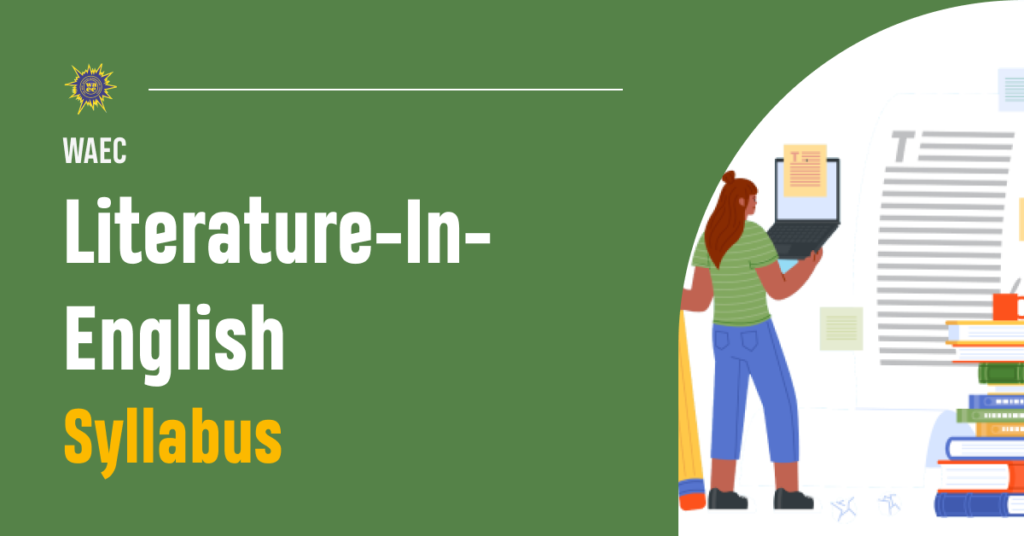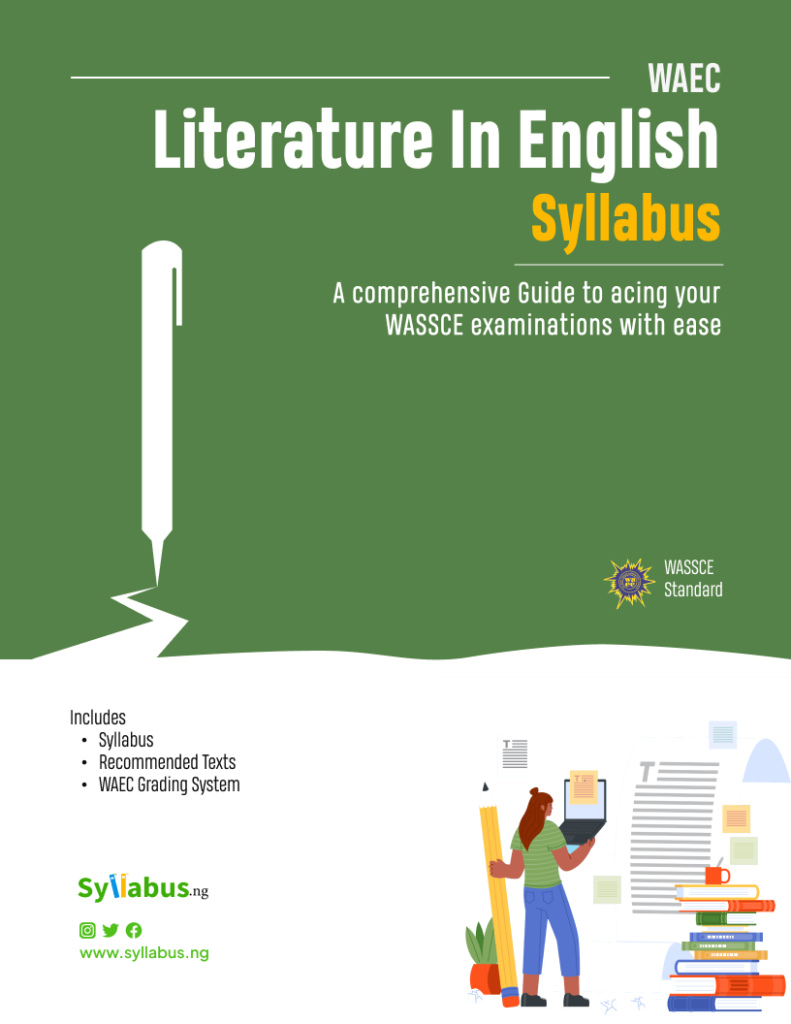Ace your WAEC with ease! Download the latest Literature-in-English syllabus now for top-notch preparation!

Home » WAEC Syllabus » WAEC Literature-in-English Syllabus
This WAEC Literature in English syllabus is one that every student who will be writing Literature-in-English in the upcoming WAEC examinations should have. It will show you a list of topics and reading texts including drama, prose, and poetry where questions from the exams will be asked from.
The main aim of the exam is to increase your level of critical thinking and your ability to interpret what you have read and learnt from the recommended novels and poems.
To excel in the WAEC Literature-in-English exam, we would advise you to study with this syllabus by your side and practice with a lot of past questions. You should also read and understand the recommended novels outlined below.
There will be three papers. Paper 1, 2, and 3. Papers 1 and 2 will be a composite paper and will be written in one sitting.
Paper 1 will be a multiple-choice. It will contain fifty questions distributed as follows:
(a) Twenty questions on General Knowledge of Literature;
(b) Five questions on an unseen prose passage;
(c) Five questions on an unseen poem;
(d) Twenty context questions on the prescribed Shakespearean text.
Candidates will be required to answer all the questions within 1 hour for 50 marks.
Paper 2 will be an essay test with two sections, Sections A and B. Section A will be on African Prose and Section B on Non-African Prose.
Two essay questions will be set on each of the novels prescribed for study. Candidates shall be required to answer one question only from each section within 1 hour 15 minutes for 50 marks.
Paper 3 will be on the Drama and Poetry components of the syllabus. It will be put into four sections, Sections A, B. C and D as follows:
A: African Drama Section
B: Non-African Drama Section
C: African Poetry Section
D: Non-African Poetry
Sections A, B, C, and D will have two questions each one of the prescribed drama texts.
Candidates will be required to answer one question from each of the sections, making a total of four questions.
The exam duration is 2 hours 30 minutes.
Note:
(i) The Unseen Prose passage for Paper 1 shall be about 120 – 150 words long.
(ii) Only context questions shall be set on the Shakespearean text. The context questions will test such items as theme, characterization, style and setting in the Shakespearean text
(iii) No essay question shall be set on the Shakespearean text

Excelling your WAEC Literature-in-English exam starts from knowing what’s expected of you.
Don’t be left behind. Download the Syllabus today.
| LITERATURE IN ENGLISH WAEC SYLLABUS | ||
| SN | TOPICS | OBJECTIVES |
| 1 | African Prose | (1) Amma Darko – Faceless (2) Bayo Adebowale – Lonely Days |
| 2 | Non-African Prose | (1) Richard Wright – Native Son (2) Patience Swift – The Last Goodman |
| William Shakespeare : OTHELLO | ||
| 3 | Non-African Drama | (1) Oliver GoldSmith – She Stoops to conquer (2) Lorraine Hansberry – A Raisin in the Sun |
| 4 | African Drama | (1)Frank Ogodo Ogbeche – Harvest of Corruption (2) Dele Charley – The Blood of a Stranger |
| 5 | African Poetry | (1) Birago Drop – Vanity (2) Gbemisola Adeoti – Ambush (3) Gabriel Okara – Piano and Drums (4) Gbanabam Hallowell – The Dinning Table (5) Lenrie Peter – The Panic of Growing Older (6) Kofi Awoonor – The Anvil and the Hammer |
| 6 | Non-African Poetry | (1) Alfred Tennyson – Crossing the Bar (2) George Herbert – The pulley (3) William Blake – The School Boy (4) William Morris – The Proud King (5) Robert Frost Birches – Birches (6) William Shakespeare – Shall I compare thee to a Summer’s Day? |
A LIST OF SELECTED AFRICAN AND NON-AFRICAN PLAYS, NOVELS, AND POEMS
Drama:
African:
Non-African:
Prose:
African:
Non-African:
Poetry:
African:
Non-African:
To create a good study schedule, a reading timetable for all the subjects you will be writing in the WAEC exams. Having a reading timetable helps you define your reading goals, learn time management and avoid cramming.
With a good reading timetable, you will be able to read and understand your syllabus and all that is expected of you in the exams.
Some common mistakes include rushing through the exam, not reading questions carefully, and poor time management skills. Remember to cross-check your work and make your writing legible enough.
The purpose of the WAEC Literature-in-English exam is to assess students’ knowledge and understanding of literary texts and works.
Focus on all topics listed in the syllabus. They all have the same level of importance.
Continuous practice is the key. Practice questions from your past questions to familiarize yourself with the question format.
If you’re unsure about a question, skip it and move on to other questions you understand and can answer. Then come back to those you don’t understand.. Don’t spend a lot of time on a question you don’t understand. It’s better to focus on questions that you are confident about.
As a general rule, you should not spend more than 3 minutes on each question in the objective section and/or 5 minutes in the theory section. However, it is important to manage your time well. It’s always better to finish before your scheduled stoppage time than trying to rush through questions you could have gotten more marks on.

Excelling your WAEC Literature-in-English exam starts from knowing what’s expected of you.
Don’t be left behind. Download the Syllabus today.